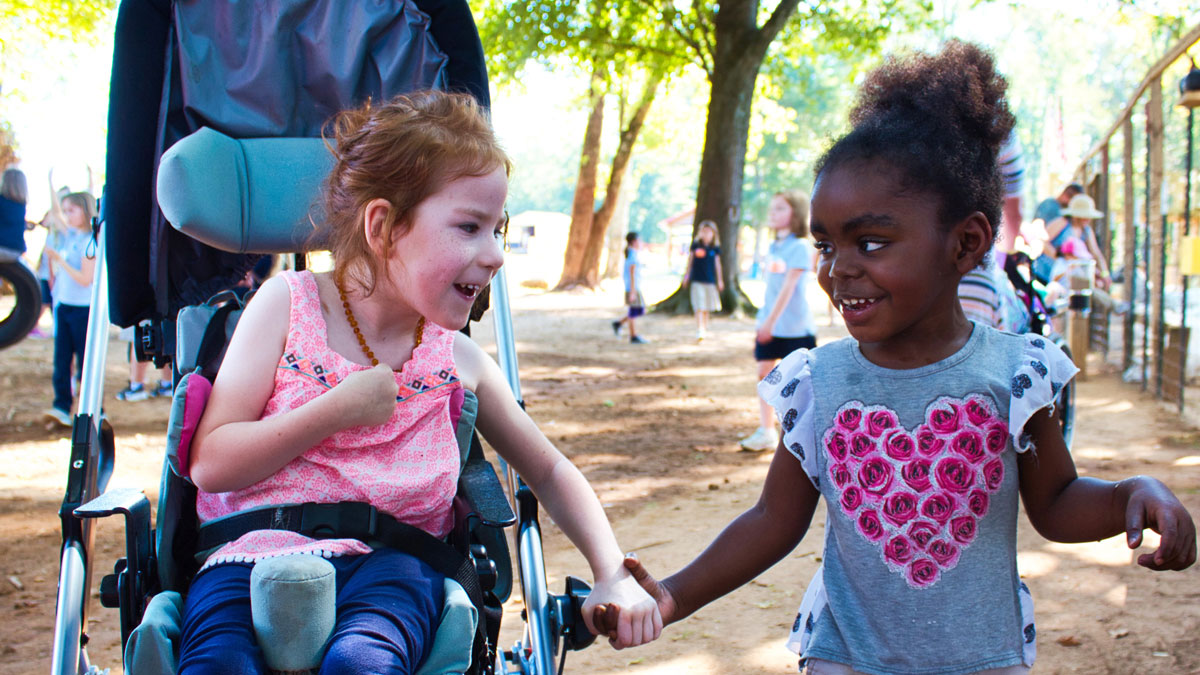Living with deafness or blindness is not without daily challenges, but the South Carolina School for the Deaf and the Blind offers students with those disabilities a foundation to thrive. Its students have access to the same educational, athletic and social opportunities that students without those disabilities experience – with added educational expertise and tools to better equip students to overcome obstacles and reach their potential.
Spartanburg is home to the school’s main campus, where three distinct programs are offered: the School for the Blind, School for the Deaf and Cedar Springs Academy, which serves students who have a vision or hearing disability in combination with at least one other physical or intellectual disability. Students across the state – as young as 3 and up to 21 – can attend the school for free. Another program, Kelly’s Kids, serves children from 6 weeks old to 3 years who are deaf, blind or deaf-blind, as well as typically developing.
Students who live more than a half-hour away can opt to live on campus. Buses pick school residents up from their homes – anywhere across the state – on Sunday evenings for the commute to Spartanburg and bring them back to their homes on Friday afternoons.
SCSDB’s curriculum covers typical school subjects but in classes that average seven to eight students, which allows ample time for specialized instruction and helps students from feeling lost or left behind in a larger atmosphere.
The campus also has an Applied Academic Center. At age 13, students begin exploring careers and continue to build a “pathway to success,” so that they are either college- or career-ready upon graduating.
Aside from academics, the bustling social atmosphere is a big draw for students to be on-campus.
“Lots of students who are blind or deaf have limited access to peers at home. Our students are just like other kids – they’re very social, they have friends and groups, they like to interact and socialize,” explained Jolene Madison, director of education services and special education. “We offer extracurricular activities like football, track and field, basketball and cheerleading – but the difference is that for many of our kids, they might not be able to participate if they weren’t on this campus.”
Though the campus opens its doors to qualified students who hail from anywhere in the state, the logistics to physically attend the SCSDB may be more than a family can commit to. The SCSDB’s Statewide Outreach Division ensures that students receive the educational services they need wherever they are across South Carolina.
The Outreach Division’s early intervention program works with children identified as early onset from birth through age 5.
“An infant or toddler is referred to our early intervention program. Then our certified teachers and service coordinators work with the family to develop an individualized family service plan for that child,” said Scott Falcone, director of outreach services. “Our teachers are certified in deaf and hard of hearing education or vision impairments and are available to assist families throughout the state.”
When the child is ready for K12, parents can choose to enroll their child at SCSDB or their local school district. SCSDB’s outreach division contracts with school districts across the state to provide itinerant services for students statewide unless a suitable program already exists at the school.
Working in conjunction with the South Carolina Department of Education, SCSDB’s blind and visually impaired students – on- or off-campus – are provided specialized equipment and instructional materials such as state-adopted textbooks in braille or large print.
Interestingly, most of the braille textbooks are produced in Greenwood at Leath Correctional Facility’s braille production center, comprised of around 20 inmates who have become certified in braille transcription. They emboss textbooks for students who are blind, and the books are shared throughout the state, as well as nationally with other state programs in need.
The outreach division also provides sign language interpreting services across the state.
“If we receive a request from a doctor’s office, state agency or work situation, we can do a remote video or on-site interpreting,” Falcone continued.
American Sign Language classes also are offered to the general community through Zoom and Moodle platforms.
Whether on campus or across the state, SCSDB ensures that students who are deaf, blind or deaf-blind are provided exceptional educational services.
“Our motto is embracing the possibilities,” smiled Madison. “We believe in giving our students the best preparation we can – making sure they are college and career ready, following the profile of the South Carolina graduate and doing so in an environment that is custom-tailored to meet the needs of our unique population. We help our students thrive in all areas – socially, academically, emotionally. This is truly a place where our students have an opportunity to shine.”
To learn more, visit scsdb.org, email info@scsdb.org, or phone the main campus at 888-447-2732 or outreach services at 800-984-4357.







